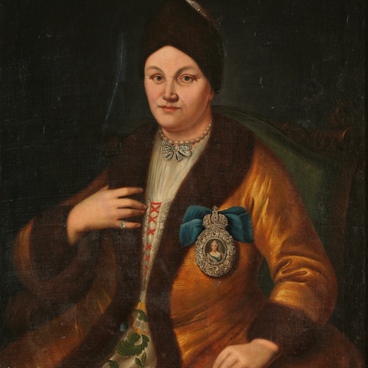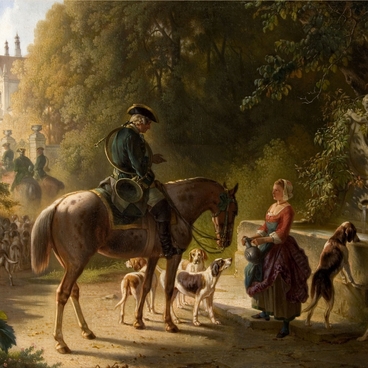A number of portraits from the estate in Karacharov represent relatives of Countess Praskovya Sergeevna Uvarova (born Princess Shcherbatova). Among the closest direct ancestors is Anton Stanislav Svyatopolk-Chetvertinsky (1748-1794) — the great-grandfather of her father’s side. The portrait of an unknown artist shows a brilliant aristocrat in a ceremonial robe with ermine and a powdered wig. The well-known published images of him are all of the same type. For example, a miniature by an unknown artist in “Russian Portraits of the XVIII-XIX Centuries”. This five-volume book was prepared followed the exhibition of Russian portrait art held in 1905 in the Tauride Palace. Tremendous organizational work has been done. Many works from private collections were presented at the exhibition, including from noble estates throughout the Russian Empire. The publication of portraits from the exhibition is a unique source, since many of the exhibited portraits were later lost: they were ruined during the revolution and the Civil War, or were taken to emigration, where they also disappeared. But even at that famous exhibition, the Polish Prince Chetvertinsky was presented only by a miniature from an unknown original. The representative of the ancient Polish princely family had two magnificent highest awards of the Polish state: Order of St. Stanislaus in 1785 and Order of the White Eagle in 1793.
He was one of the most eloquent speakers of his time, boldly defended his beliefs at the sejms of Poland, defending the gentry liberties, refused to sign the act of partition of the Polish-Lithuanian Commonwealth. In 1791, Chetvertinsky delivered a heated speech at the Sejm against the draft of the new constitution, ending it with the following words: “There are liberties in it, and I do not agree to accept it. If my civil jealousy remains without consequences, then at least be witnesses that I protested and cried.”
Chetvertinsky belonged to the prominent political figures of the Polish-Lithuanian Commonwealth, and as an ardent supporter of the Russian party was hanged right in front of his family during the Polish uprising, in the so-called “Polish matins”. Catherine II took part in the fate of his children. Son Boris — Praskovya Uvarova’s grandfather — was assigned to the guard. The daughters were educated and considered the first beauties and were married.
He was one of the most eloquent speakers of his time, boldly defended his beliefs at the sejms of Poland, defending the gentry liberties, refused to sign the act of partition of the Polish-Lithuanian Commonwealth. In 1791, Chetvertinsky delivered a heated speech at the Sejm against the draft of the new constitution, ending it with the following words: “There are liberties in it, and I do not agree to accept it. If my civil jealousy remains without consequences, then at least be witnesses that I protested and cried.”
Chetvertinsky belonged to the prominent political figures of the Polish-Lithuanian Commonwealth, and as an ardent supporter of the Russian party was hanged right in front of his family during the Polish uprising, in the so-called “Polish matins”. Catherine II took part in the fate of his children. Son Boris — Praskovya Uvarova’s grandfather — was assigned to the guard. The daughters were educated and considered the first beauties and were married.

